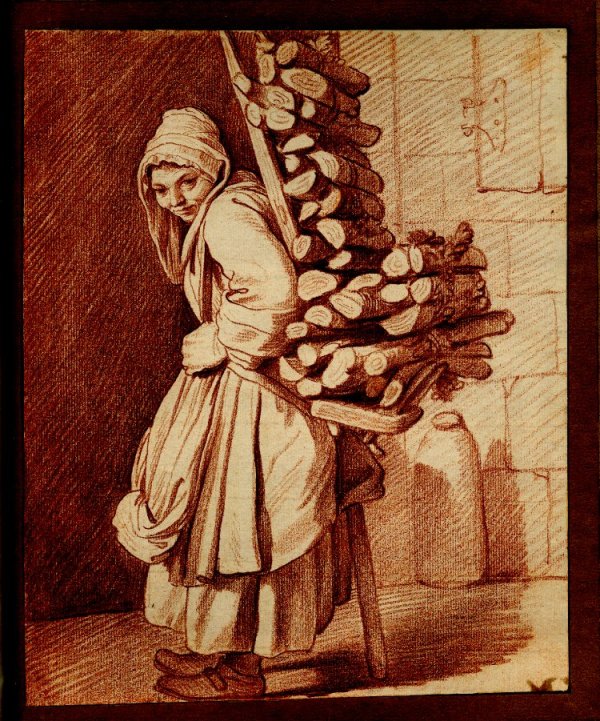
A tall pine-tree had been cut down in the forest, and dragged away to a back yard, where it now lay chopped into blocks of wood for fuel, piled up on the top of one another. Near the yard, on the other side of the hedge, was a garden with a green lawn, and out amidst the foliage there peeped forth a charming villa, where a family from the neighbouring town were wont, during the summer months, to come to live, and inhale the balmy air and bask in the country sunshine.
During the long, dreary spring the wooden logs had plenty of time to reflect on their future, but the majority of them were agreed that there was not much to reflect upon, for the fate of a log of firewood was once for all decided, and could not be altered.
“We are not good for anything else but to be chopped up into little chips, and consumed in the large fire-place,” one of the blocks of wood said to the others.
“It is, alas! our pre-ordained destiny,” sighed another.
“We, the offspring of the forest, cannot attempt anything nobler than to become fire and flames, and to boil the pot,” added a third.
But one of the little blocks that was without either flaws or cracks, and which was lying there by itself, so white and pretty, could not agree in its mind that it would not become anything better than charcoal and cinders; and when it heard the disconsolate talking of its comrades, the little white block begged to differ: “Who knows what one is good for!”
But the others considered that it only spoke in pride, and said, “We shall meet again—in the fire-place.”
The guests from the town arrived at the villa. A journeyman threw down the pieces of wood from the big pile, he sawed and cut them into little pieces, preparing one log after another for the fire-place.
“Kneech, krasch!” said the logs as they were being chopped into little bits; and when the servant girl carried them into the kitchen, they all whispered to the little white log, “It will be your turn next.”
One day the owner came into the back yard, and had his little son with him.
“Now we will knock them with the axe, and hear by the ring whether there is a good piece of timber among them,” said the father, and hammered away on one piece of wood after another.
“No good, no good, only to burn!” all the blocks answered. But soon he came to the little white log, and it had quite another sound.
“Knock on, knock on, fit for anything!” it chimed in the wood.
“There we have one with a good ring in it. Let us take that one,” said the father; and he commenced at once chopping large chips from the log, both before and behind, and on both the sides.
“I shall burn as I am, entire, but you will be chopped into contemptible sticks,” said a crooked twisted bit of a branch with spite. But though its fibres were terribly cut every time the axe fell, still the little white log thought, “One must be shaped and formed before one can be fit for anything in this world.”
And, after every cut from the axe, the form of the log became more spruce and handsome. From a log it was soon formed into the shape of a ship’s hull, and carried away to the carpenter’s workshop, and with a screw affixed to the carpenter’s bench, to suffer more pains in the clutches of various tools.
“She will be a fine clipper,” said little Harry, with delight, when after a couple of days he came into the carpenter’s shop, and saw how the uncouth log gradually had been transformed into a trim little boat, with smart prow, deck and mast.
“I know now what will become of me,” thought the little boat with feelings of exultation, and was quite impatient to be let loose from the screw of the carpenter’s bench, and to be launched out on the limpid waters.
And soon it was completely rigged, the shrouds reaching from the top of the mast down both sides, and out on the bowsprit in perfect fashion.
“There is still something very important wanting, before I can proceed out on the watery main of my own accord,” said the boat.
Then the sails were hoisted, white and flapping. “These are my wings,” it thought; “but still I want something more.”
And then the rudder was affixed, for without that the boat would have been helpless, and not able to steer a right course. “Now I feel myself safe; now I long to leap along the crested billows,” said the eager little ship.
And young Harry took her in his arms and carried her to the creek. His father accompanied him, and all, big people and little folks, whom they met on the road turned and went with them to the shore to see the little boat sail across the tiny bay.
Amid exulting shouts and cheers, the little boat was launched. The wind swelled the sails, and, as if it were a swan, it was borne along the waves, now raised aloft on their surging crests, now descending their foaming valleys. The water glittered in the sunlight; the foliage of the green trees mirrored itself in the serene waters on the side of the creek from which the gentle wind came, and where the waters were unrippled.
“Such happiness I never dreamt of!” thought the boat, and listened with delight to the praise bestowed upon her by all for being so trim and smart.
“See how she dances on the waves—my pretty yacht!” exulted little Harry.
“A regular clipper!” said the father, and then smiled.
“She seems as if she were almost a living being!” said one of the lookers-on.
And the little skiff almost jumped along the billows for very joy to hear these praises; but suddenly she stopped—thought a moment—turned, and steered towards land.
“Right you are, you little skiff, sweep along the shore again; we have forgotten the most important thing of all,” said Harry’s father.
And the boat landed again. A tiny piece of blue silk with a yellow cross was hoisted to the mainsail. It was the Swedish flag!
“Now at last you are fully equipped,” said the father; and louder and lustier rose the cheering of the onlookers as the tiny schooner sailed afresh across the bay, and the flag waved in the wind.
“The blue flag with golden cross speaks of the blue sky and the golden sun that shed their lustre over the country of my birth!” exulted the little boat, and felt her heart beat with joy that she had believed in her true calling from the very first, until now at last it had come to pass that she had emerged from her obscure and lonely sphere to become admired and loved, and carry the Swedish flag to honour and glory.

From the Swedish of Richard Gustafsson
(Translated by Albert Alberg)
Chit-Chat by Puck:
Tea-Time Tales for Young Little Folks and Young Old Folks – 1880
—Jeff Burks